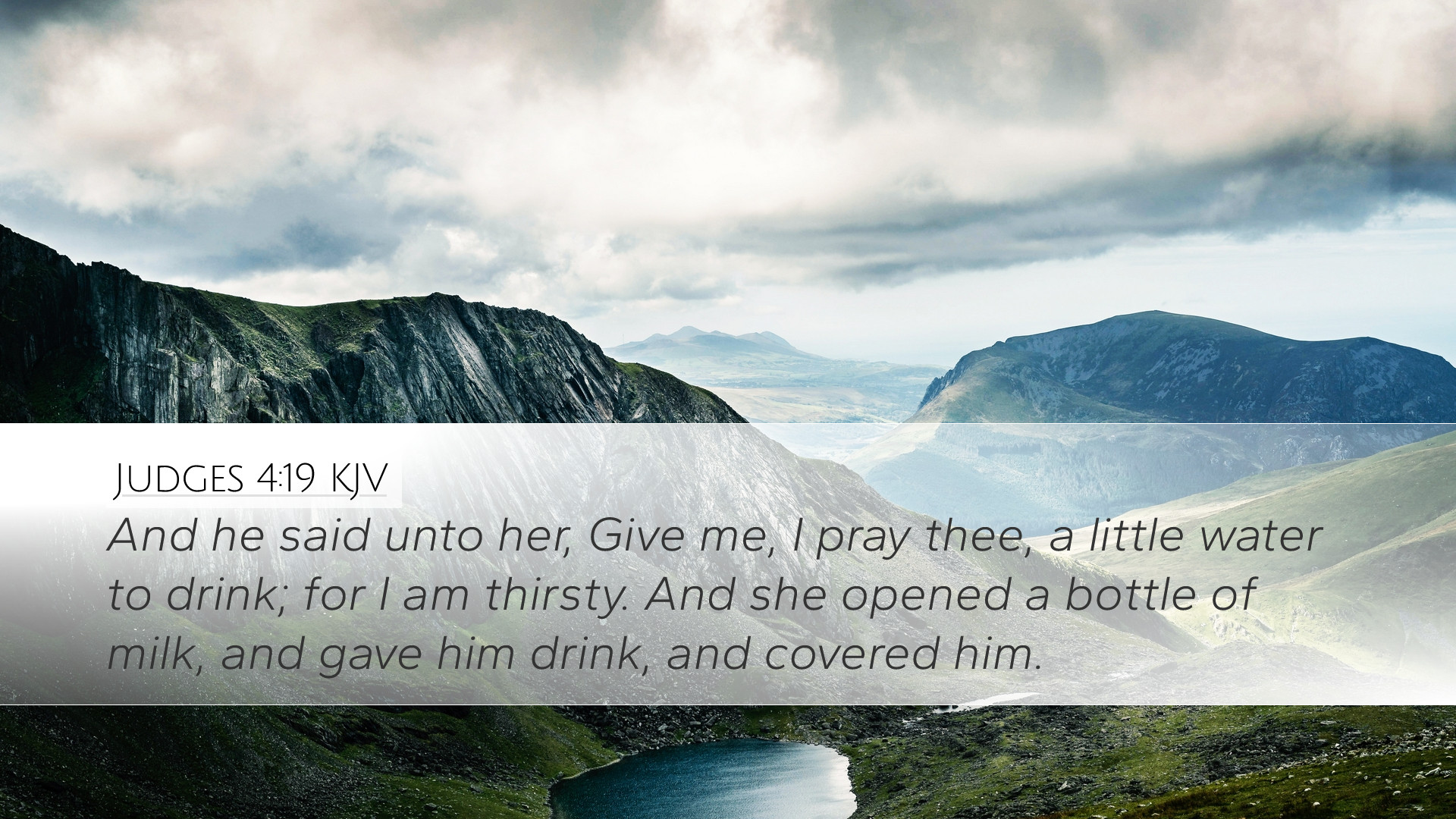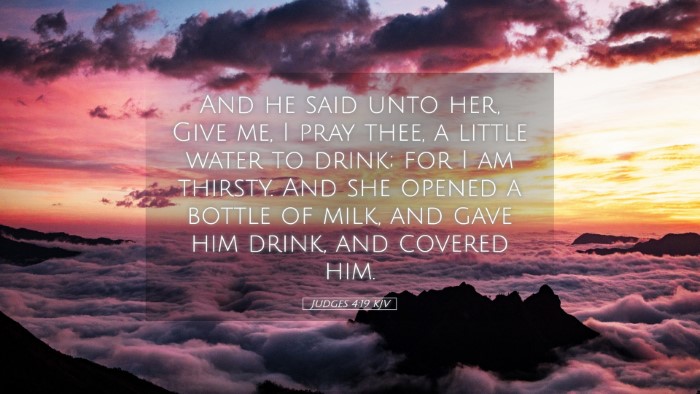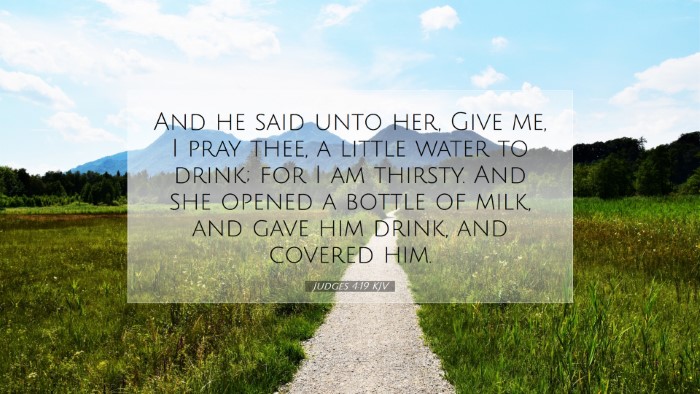Old Testament
Genesis Exodus Leviticus Numbers Deuteronomy Joshua Judges Ruth 1 Samuel 2 Samuel 1 Kings 2 Kings 1 Chronicles 2 Chronicles Ezra Nehemiah Esther Job Psalms Proverbs Ecclesiastes Song of Solomon Isaiah Jeremiah Lamentations Ezekiel Daniel Hosea Joel Amos Obadiah Jonah Micah Nahum Habakkuk Zephaniah Haggai Zechariah MalachiJudges 4:19
Judges 4:19 KJV
And he said unto her, Give me, I pray thee, a little water to drink; for I am thirsty. And she opened a bottle of milk, and gave him drink, and covered him.
Judges 4:19 Bible Commentary
Commentary on Judges 4:19
Judges 4:19 (KJV): "And she said unto her, Give me, I pray thee, a little water to drink; for I am thirsty. And he opened a bottle of milk, and gave her drink, and covered her."
This verse is pivotal in understanding the unfolding narrative in the Book of Judges. It features Jael, the wife of Heber the Kenite, and Sisera, the commander of the Canaanite army. The interaction between these two characters not only illustrates the themes of hospitality and treachery but also reflects broader theological points about divine providence and the roles of women in God's plan.
Contextual Background
The events of Judges 4 take place during a period of tumult in Israel's history, where the people often turned from God and faced oppression from their enemies. Deborah, a prophetess and judge, arose to lead Israel against Jabin, king of Canaan, and Sisera, his military leader. The women's role in the narrative is pivotal, marking a transition in the socio-religious dynamics of ancient Israel.
Insights from Public Domain Commentaries
1. Matthew Henry's Commentary
Matthew Henry emphasizes Jael's decisive action and portrays her as a woman of remarkable courage and cunning. He notes that despite being in a potentially dangerous situation, she provides Sisera with hospitality. However, her offer of milk instead of water indicates a biblical shift in expectations - she engages in a deceptive hospitality that leads to Sisera's downfall.
Key Themes from Henry:
- Hospitality: Jael’s offering reflects the ancient Near Eastern custom of hospitality, yet it is laced with deeper implications as it leads to treachery.
- Divine Providence: Henry points out that God used Jael to fulfill His purpose in delivering Israel from oppression.
- Women's Role: Historically marginalized, Jael's actions highlight that God can and does use women in critical roles throughout salvation history.
2. Albert Barnes' Notes on the Bible
Albert Barnes provides a detailed exposition of the cultural context surrounding this encounter. He notes that milk is a staple drink, which might have been intended to calm Sisera or lead him into a false sense of security. This act of offering him something nourishing was both a symbol of kindness and a veil for her true intentions.
Insights from Barnes:
- Symbolism of Milk: It conveys comfort and care, contrasting sharply with the violent intentions of this encounter.
- Strategic Deception: Barnes discusses the cleverness of Jael’s actions—by offering hospitality, she disarms Sisera, making his defeat more impeccable.
- Judgment Against Evil: The act of Jael serves as a divine judgment against Sisera’s oppression of Israel.
3. Adam Clarke's Commentary
Adam Clarke delves into the linguistics and the specific wording used in this passage. He points out the Hebrew text's nuances and the underlying moral implications. Clarke emphasizes how Jael’s actions stem from the sovereignty of God, controlling the outcome of human affairs.
Clarke's Observations:
- Divine Sovereignty: Clarke illustrates that God's purposes cannot be thwarted; He ordained this meeting with Jael and Sisera long before it occurred.
- The Role of Women: Clarke affirms that women in Scripture often played significant roles during times of crisis, indicating God's inclusive call to service.
- Contrast of Action: Jael’s actions create a stark contrast with the portrayals of female characters in both positive and negative lights throughout Judges.
Theological Applications
This verse invites several theological reflections that are essential for pastors and scholars alike:
- The Nature of Providence: The unfolding of events in Judges 4 underscores God's providential governance over history, where He uses unexpected means to accomplish His plans.
- Gender Dynamics in Ministry: Jael’s role exemplifies a broader biblical pattern where God utilizes individuals across gender lines to achieve His purposes, challenging traditional views of women's roles in service and leadership.
- Hospitality and Treachery: This passage challenges readers to consider the complexities of human relationships, where hospitality may hide malicious intent, urging discernment in ecclesiastical and personal interactions.
Conclusion
In Judges 4:19, the interaction between Jael and Sisera encapsulates rich theological themes, cultural dynamics, and the complexity of human agency against the backdrop of divine sovereignty. Commentary from Henry, Barnes, and Clarke offers diverse yet complementary insights that encourage deeper reflection on the text’s implications for contemporary faith practice.
This analysis emphasizes the importance of understanding Scripture not only in its historical and cultural context but also in its relevance to current ecclesiastical life and the lived experiences of believers. In essence, Judges 4:19 serves as a profound reminder of God’s ability to work through unlikely vessels to fulfil His redemptive plans.


